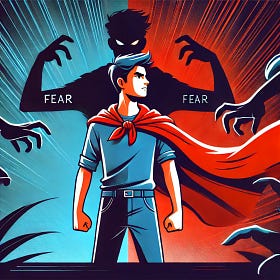Hi all,
Welcome to another edition of Sweet Bites, Mind Candy’s bite-sized newsletter with thought-provoking finds to send you into the weekend with.
Any of the below bites resonate? Hit the reply button and let me know.
Choose Your Dessert for the Week
🍰 Mini Bite
Nobody Cares
For the first ten years or so of his career, the author Dennis Lehane, known for such hits as Mystic River and Shutter Island, carried around in his pocket a 3X5 notecard with the words “NOBODY CARES” written on it.
“Nobody cares. That’s not just negative, that’s positive too,” he says. “Yes, nobody cares. Whether you publish or not, nobody cares…”
We often put a tremendous amount of pressure on ourselves to be perfect, and this tends to hold us back, it builds fear in us and prevents us from actually doing the work.
“Nobody cares. There is no weight on you, no one is keeping score, nobody is watching you, nobody is, you know, sitting up there tabulating you’re not good enough yet. Just relax, catching the best zen sense with that concept. Nobody cares.”
Our fear grows out of our comparison of our day one to someone else’s day 1000. All the pursuits you want to accomplish, the things you aspire to do, those are not day one aspirations, they’re day 1000, 2000, 3000 or more.
This is the reality of pursuits, they take time and dedication. One needs the reps, the practice, in their craft in order to turn day one into day 3000.
And that’s freeing because it means while you work at your craft, while you struggle or make mistakes, no one is watching, no one sees, nobody cares. And so you are free to play around, to learn the ins-and-outs, to understand nothing is on the line except for your ability to sit, learn, and try to be better.
“Take as much joy from the process as you can. Having said that, it is work. Wanting something and earning it are two different things.”
The next time you start to get nervous or fearful, just remember, nobody cares, you’re here to learn, and only through trying over and over again does that happen.
📚 This Week’s Monday Meditation
Learning to Embrace Discomfort
This Week at a Glance: This week, we explore the advice William James gave to himself in order to overcome his melancholy and once again embrace life.
✏️ This Week’s Wednesday Wisdom
📰 Article Worthy of a Read
How to embrace uncertainty by Arie Kruglanski
Kruglanski is a Distinguished University Professor at the University of Maryland, College Park. In this article, he tackles how one can best overcome their fear of uncertainty and embrace it. He also recently released a book. Uncertain: How to turn your biggest fear into your greatest power.
Favorite Quotes/Passages:
“The research suggests that a person’s long-term history can be temporarily counterbalanced by more recent events (eg, positive events might lead to a boost in optimism), but that one usually returns to the baseline level of optimism or pessimism.”
—
“The next time you are feeling concerned or anxious about one or more uncertain situations you face (which may be right now), take some time to observe the thoughts, feelings and physical sensations that the uncertainty brings up. Instead of chasing it away, embrace it; instead of denying it, accept it. Give this some space and time – maybe 10 minutes, maybe longer, but make a date with it, and show up for it.”
📖 Book Recommendation
The Gift of Fear by Gavin de Becker
Gavin de Becker’s book can best be summed up in the following: trust your instincts.
In this excellent read, de Becker breaks down exactly how our instincts read scenarios our conscious mind does not immediately grab. With stories from real-life clients and his own life, de Becker shows just how much our instinct tries speaking to us, and how fear can in fact be used for good.
🦉 Wisdom
“We can experience fear, confidence, desire, anger, pity, and generally any kind of pleasure and pain either too much or too little, and in either case not properly. But to experience all this at the right time, toward the right objects, toward the right people, for the right reason, and in the right manner—that is the median and the best course, the course that is a mark of virtue.”
Aristotle
Source: Practical Wisdom
🏋🏻 Exercise
An exercise from Arie Kruglanski in the above-referenced article How to embrace uncertainty.
“Be your own defence attorney
As a first step toward changing your relationship with uncertainty, try the following exercise. Think of up to three past instances that caused you distress. These could be rejections that you received, or failures in personal, professional or academic domains. You might be tempted to see these events as signs that a future failure or disappointment looms whenever you face a new situation involving uncertain outcomes. I want you to take a different perspective.
For each of the instances you have recalled, write out several reasons you would use to convince other people (a ‘jury’ of your peers) that the unwanted outcome was unique to specific circumstances, and is unlikely to repeat itself in the future. The reasons you come up with should be plausible and realistic, of course. For instance, suppose that you recently applied for a job and were not hired. A reason that’s unique to that situation might be that you were tired during the interview because of a lack of sleep the night before. Or that your work experience to date doesn’t totally fit some of the requirements that were specific to the advertised position. Imagine another example: you lost a sports match you hoped to win. One reason you note for your defeat might be that you didn’t train enough in the weeks prior to the competition. Other reasons could be that you haven’t gone far enough to develop the skills required to address that opponent’s particular style, or you were distracted during the game by thinking about your work problems, and so on.
Try doing this exercise twice a week, for a couple of months (you can alternate exercise weeks with ‘off weeks’, if you’d like). Over time, this exercise, which is based on the pioneering work of the psychologist Martin Seligman, can help you develop a more positive attributional style – one that immunises you against the tendency to fear and accentuate negative possibilities. This positive-thinking habit can serve you well in approaching uncertain situations. Rather than being down on yourself and assuming that it’s simply your personality or a general lack of talent or social skills that produced a previous rejection or failure, you may be more inclined to look for external or temporary conditions to help explain what happened. When encountering a new, uncertain situation, this can help you avoid assuming that a previous disappointment means that another one is likely to happen again soon, and reduce your apprehension.”
Until next time,
D.A. DiGerolamo
We are a participant in the Amazon Services LLC Associates Program, an affiliate advertising program designed to provide a means for sites to earn advertising fees by advertising and linking to Amazon.com.
















